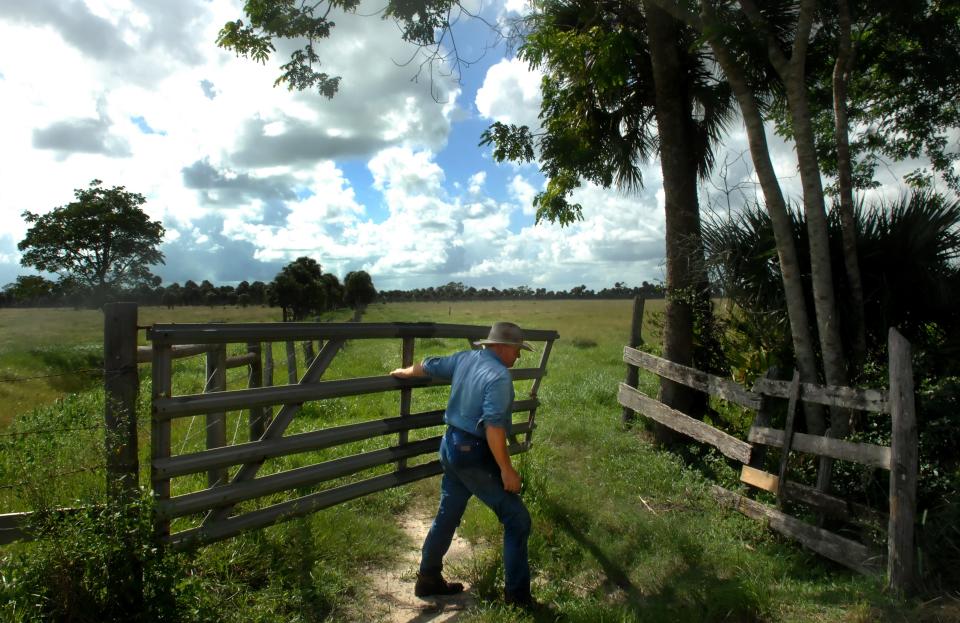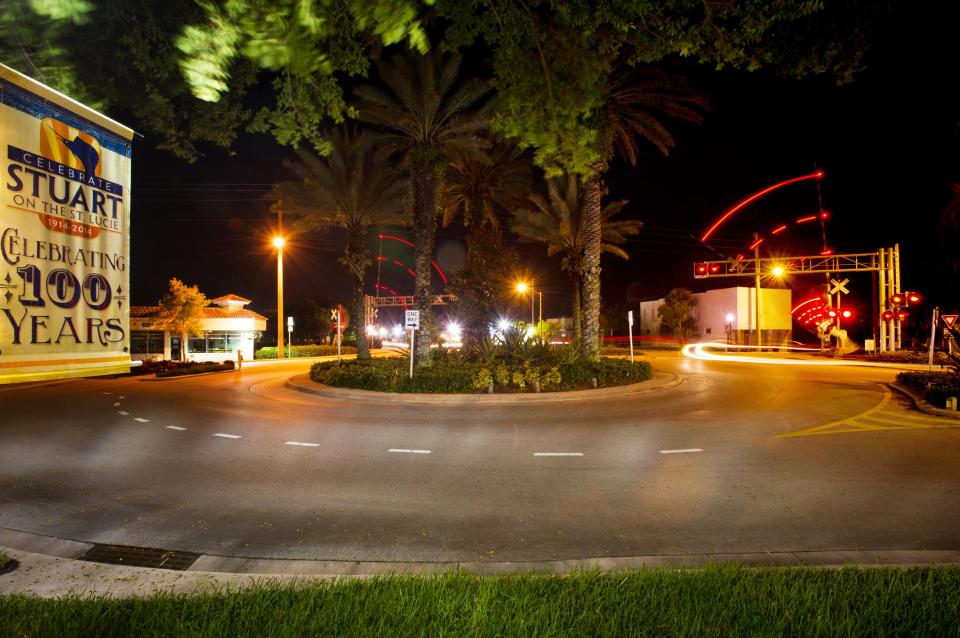DeSantis fine; Confusion Corner, Brightline not; taxes; land buys; speeding | Letters
- Oops!Something went wrong.Please try again later.
Preserving Florida land critical to its future
I love the state of Florida. Clearly, I’m not alone. Florida consumer sentiment is up 8 points from last year, according to analytics collected by the University of Florida’s Bureau of Economic Business and Research.
With 1,200 people moving to Florida each day, Florida’s population has surpassed 22 million. Last year, it was the fastest-growing state for the first time since 1957.
Politics has played a role in the migration to the Sunshine State. Gov. Ron DeSantis has managed to make an already enticing prospect even more attractive to a lot of people.
What’s amazing is with all this growth and development, our state leaders are desperately working to make sure Florida remains the paradise it is today and has been in the past.
The governor and Cabinet are preserving more land than ever before. Last month, together they approved spending $100 million on the preservation of 40,000 acres of an expanding wildlife corridor, including more than 18,000 acres of acting agricultural land.
I come from a family of farmers, so I know farming has a substantial economic impact on our state. Preserving these areas will ensure they remain a critical part of our infrastructure.
I’m also grateful foreign entities won’t be allowed to come in and sweep up the farmland that provides food to so many Americans every day.
I was born and raised in Okeechobee, a third-generation Floridian who lives in Martin County. As a real estate broker, it might seem counterintuitive that I’m also a preservationist.
While I believe development is important for the future growth of our state, what’s even more important is the proper balance of development and preservation. We want to keep what makes Florida unique so we can recognize the Sunshine State many moons from now.
Brandon Tucker, Martin County

Stuart, Brightline inaction could devolve corner from confusing to deadly
It’s time to get serious about the “confusion” at the “corner” in Stuart.
I guess we have accept that Confusion Corner will not receive any significant traffic deviation changes. I submit, however, that the confusion part of the equation is directly related to incompetent signage and will likely contribute to death as increased speed and frequency of trains evolve.
As an example, approach the intersection from eastbound Colorado. Is there any consistent signage to indicate which of the six choices you have within the next 200 yards? Any signs that are there are already in the next intersection and are almost inconspicuous. Any roadway markings disappear as the sight line across the hood of the car is elevated over the crossing.
This sad story is presented again and again from any approach to the intersection. There is no overhead signage.
The fact that we are now in our second closure to add pavers to replace white lines without improving the intersection clarity at all is borderline criminal. We may laugh at our confused snowbirds and seniors, but tears are coming.
Any driver who feels unsure of the transition through this intersection will surely hesitate ― and where? ― in the middle of the railbed! Next time through, take note.
If it is budget or resources, give the signage project to a third-year engineering class. I am convinced even modest suggestions will be better than the best Brightline and Stuart roadway solutions to date.
If officials accept that periodically dropping multiple barriers 30 times a day in the middle of that mess is an acceptable risk, let’s see how that works out.
Clear signage, possibly roadway signals, may give our citizens and visitors a fighting chance.
Tom Edmonds, Stuart

Homeowners victimized by vicious circle of tax and spend
I was dismayed to read this in the newspaper: “INDIAN RIVER COUNTY — The strong real estate market seen across the Treasure Coast has translated into increases in taxable values here, specifically a 12% increase to $26.2 billion, according to preliminary numbers from the Property Appraiser’s Office … ”
My point is just because my property increased in value does not directly translate to me having the equal amount of increased income. So, why can’t the local governments live on a fixed income like a lot of us do?
I’d rather see next year’s new spending based on actual “needs,” rather than just an arbitrary real estate cabal-generated percentage. And by cabal, I mean collusion between the taxing authorities, local real estate businesses, banking and loan companies, title, insurance companies, etc., who are all set to gain financially when we can no longer afford our homes due to taxes and forced to sell. Then upon our selling, there are commissions, fees, interest rates etc., fueling these enterprises.
Worse yet, our old homes are wiped off the property and replaced by “new,” thus fueling local construction and building trades, as well as local sales of stuff most requiring bank loans, commissions paid, etc.
It’s nothing but a vicious circle with lone citizen victims.
David Lutz, Vero Beach
Cutting speed on Indian River Drive in St. Lucie a safety concern
Cutting the speed on Indian River Drive is wrong. I have traveled from Fort Pierce to Walton Road daily.
Now I have to decide whether to use the dangerous U.S. 1 on my travel. I do not know the history, but I would think there are more accidents per capita on U.S. 1 than Indian River Drive, where I traveled daily and did not see these accidents and enjoyed the scenic drive at 35 mph.
Now I can expect a lot of people passing me, causing accidents. Which travel is safer for the public?
John Klosterman, Port St. Lucie
Politics today reminiscent of 1780s; founders tinkered
On Nov. 15, 1777, the Continental Congress adopted the Articles of Confederation.
Ratification by the 13 states took over three years, creating a loose alliance of sovereign states and a relatively weak federal government.
These articles were essentially a military cooperative to fight the Revolutionary War. Unfortunately, the fledgling Congress had no taxation authority, making borrowing from other countries difficult because the young nation had inadequate means to repay its creditors.
It soon became apparent this imbalance between empowered states and an impotent central government was unworkable, leading to the Constitutional Convention in 1787.
James Madison believed the revolution hadn’t resolved the social problems that triggered the war: Some of the excesses attributed to the English king were being repeated by authoritarian state legislatures.
What an irony. Our deeply divided politics has created a deeply divided republic, reminiscent of the 1780s. Political controversies, manufactured out of whole cloth by artful political operatives and opportunistic politicians, have become cultural battlegrounds waged from opposite ideological poles.
We must not overlook the role state legislatures play in intensifying American biases. Pick your favorite poisonous prejudice — abortion rights, critical race theory, DEI programs, LGBTQ+ rights, minority voting access, etc. — and conservative legislatures are fueling fires to incinerate individual and group freedoms.
Madison believed the primary problem with the Articles of Confederation was ceding too much power to the states. During the 1787 convention, he turned the argument away from absolute state sovereignty toward a compromise of shared power, writing that a federal government should “protect the minority … against the majority” because unchecked democratic communities were subject to “the turbulence and weakness of unruly passions.”
Left unchecked, “democratic communities” of all kinds can subvert the freedoms of minorities, resulting in undemocratic authoritarian behavior Alexis de Tocqueville called “the tyranny of the majority.”
Cray Little, Vero Beach

Instead of willy-nilly busing immigrants, vet them properly
As the immigration crisis at the southern border continues unabated, both political parties are missing the bigger picture: Vetting of immigrants for their skills.
Vetting immigrants to determine their skills and education would help local, state and federal officials place them within our society. We vet the incoming for criminal activity, but nothing more.
Local, state and federal governments should be vetting them to establish who among them are electricians, plumbers, farm workers, health-care aids, restaurant workers, construction workers and mechanics and who have degrees and in what disciplines.
Wouldn't knowing what skills and education immigrants possess help determine what part of the country they would be best suited for?
Vet them at the border, match them up to open positions around the country, give them green cards and let them start earning wages and paying taxes.
Haphazardly moving immigrants from city to city by local, state and federal government agencies is unproductive, and as we have seen, creates more problems and stress on the cities they are being moved to.
Bart Hollobaugh, Jensen Beach
Why isn't seaweed cleaned from beaches?
When is something going to be done about all the seaweed on Jensen Beach? It has gotten out of control and is driving away tourism.
Take a look at the webcam at evsmartin.com. Don't use the environment as an excuse. This is a health hazard to humans. It's disgusting and it stinks!
Carol Hansen, Port St. Lucie
Growth a huge challenge for Florida
I am not happy. Everywhere I go there are trees being toppled, land being cleared and apartment buildings being built.
More and more people are coming down to Florida. When is it going to stop? When there is no more land left? Whoever is in charge of this growth will find land in the Everglades.
This government in Florida better save some land for hospitals, sheriff's offices, jails, landfills, etc. With all these people moving down here, why keep raising taxes?
Roy Pelella, Stuart
Columnist wrong on DeSantis; he's been effective
It seems as if columnist Rex Huppke wasted no time in jumping on the "I Hate Ron" bandwagon in his recent column.
I did find it hilarious that he would quote a poll by the "progressive think tank Data for Progress" as a window into Florida Gov. Ron DeSantis' popularity. He does know it is a completely biased organization and the only thinking it does is to come up with ways to promote the left's agenda?
Huppke challenged people to come up with how DeSantis' priorities align with their own.
For starters, he handled the pandemic far better than most did at the time. He didn't rely on dictates from Dr. Anthony Fauci or Joe Biden, but did his own research, for which he was harshly criticized by the press. He reopened schools in 2020 and had to fight lawsuits to do so. According to US News and World Report, Florida now ranks No.1 in the United States for education.
DeSantis was also among the first governors to reopen his state's economy. He showed courage in going against the lockdown elites and did what he thought was best for the people of his state. His legislative record includes school choice, more than $3 billion for Everglades restoration, tort and insurance reform, paycheck protection for workers in public unions, tax cuts and insisting on free speech in higher education.
And yes, for resisting woke ideology, which some forget was something we only heard about since the left, using deceit (the Durham Report) and omission (the laptop) got an elderly career politician into the White House. Since then, we've all been held hostage to the Bernie Sanders left whether we're willing to admit it or not.
No matter how much people whine about his handling of Disney and keeping inappropriate books out of school libraries, what America needs now is someone who is solid on the important issues of the day and who will not continue to lead us down the path of division and animosity this administration has so skillfully taken us.
Patricia Perrone, Stuart
Readers offers mascot that 'accurately' reflects New College vision
New College of Florida was searching for a mascot to more accurately reflect the new vision of the college, as put forth by Gov. Ron DeSantis.
To that end, I humbly submit, the ostrich!
What better personifies the new goals of this school than a bird who buries its head in the ground and therefore can ignore the realities of the world? (And the bird also lays really big eggs.)
Tony Lella, Port St. Lucie
Holocaust example irrelevant when it comes to right to bear arms
Recently a letter was published using the Holocaust as a reason to support the Second Amendment. The author presents a personal narrative of his family's history, highlighting the atrocities his ancestors endured during the Holocaust.
While the author's family history is undeniably tragic, an emotional anecdote does not serve as a compelling rebuttal to Florida Southern College Professor Bruce Anderson's viewpoint. It is good to remember that Adolf Hitler expanded license-free gun ownership in Germany in 1938; he did not fear an armed populace.
The author argues that the Second Amendment was designed as a safeguard against tyrannical government, citing the American Revolution as evidence. The Revolutionary War was fought against a foreign oppressor, not a domestic government. The framers' intent was to ensure the right to bear arms for collective security, not to promote armed insurrection against a duly elected government. The Constitution speaks against armed insurrection.
The assertion that diplomacy would have kept America a British colony overlooks much of the American Revolution. Diplomacy played crucial roles in our independence, more than a militia. The Revolutionary War was won through a combination of military action, political maneuvering and diplomatic efforts.
Professor Anderson's interpretation of the Second Amendment and his argument for sensible gun regulations are grounded in a contemporary understanding of the issue, taking into account the need for public safety, prevention of gun violence and the evolving nature of society. Striking a balance between individual rights and public safety is a complex task that requires nuanced discussions and evidence-based policies.
Historical context, the evolution of society and the imperative of public safety necessitate thoughtful and responsible gun control measures. Advocating for reasonable regulations does not undermine the principles upon which the United States was founded; rather, it reflects a commitment to adapting and improving society in a manner that benefits all citizens.
Kirk Kirkpatrick, Port St. Lucie
This article originally appeared on Treasure Coast Newspapers: DeSantis fine; Confusion Corner, Brightline not; land buys | Letters

